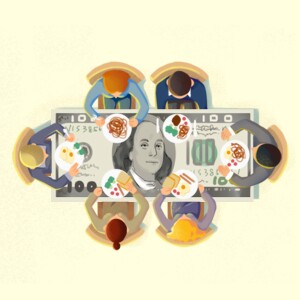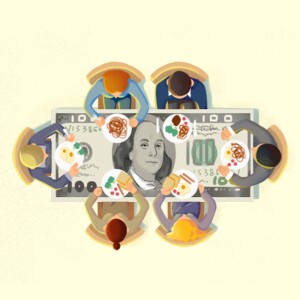Centro de libros de autoayuda
¡Hola a todos y bienvenidos al podcast! Aquí, donde la sabiduría se condensa en dosis concentradas, nos sumergimos en el fascinante mundo de los resúmenes de no ficción. Cada semana, exploramos los temas más relevantes e intrigantes del mundo actual, desde ciencia y tecnología hasta negocios y filosofía. ¿Te falta tiempo para leer esos largos libros que llevan meses en tu lista de pendientes? ¡No te preocupes! Nuestro equipo de expertos hace el trabajo por ti, destilando las ideas clave y enseñanzas cruciales en resúmenes breves y accesibles. Acompáñanos en este viaje de conocimiento, inspiración y crecimiento personal mientras desentrañamos juntos la esencia de lo mejor de la no ficción. ¡Empecemos! Website: https://bookeygetbooks.wixsite.com/bookeyes
Episodes

Tuesday Feb 13, 2024
Tuesday Feb 13, 2024
What is the meaning of The Undoing Project
"The Undoing Project" refers to a non-fiction book written by Michael Lewis, published in 2016. The book explores the collaboration between two Israeli psychologists, Daniel Kahneman and Amos Tversky, who revolutionized the field of behavioral economics.
The title suggests the idea of unravelling or undoing preconceived notions and traditional approaches to understanding decision-making and human behavior. Kahneman and Tversky's research challenged the traditional economic models that assumed humans are always rational and objective in their decision-making processes. They demonstrated that humans are often influenced by cognitive biases, heuristics, and irrational behavior.
"The Undoing Project" delves into their partnership, friendship, and the impact of their research on various fields, such as economics, psychology, and decision-making. The book sheds light on their experiments, theories, and their enduring influence on understanding human behavior and decision-making processes.
What is the message of The Undoing Project
The message of The Undoing Project is that human decision-making is often flawed and influenced by cognitive biases, which can lead to errors and wrong judgments. The book also highlights the importance of introspection, self-awareness, and collaboration in reducing these biases and making more rational decisions. Additionally, it emphasizes the significance of understanding and acknowledging the complexities of the human mind in various fields, such as psychology, economics, and social sciences.
What is the most important information about Michael Lewis
Michael Lewis is an acclaimed American author and journalist known for his works on finance and economics. He has written several bestselling books, including "Liar's Poker," "The Big Short," "Moneyball," and "The Blind Side," which have been widely praised for their engaging storytelling and insightful analysis.
One of the key aspects of Lewis's writing is his ability to make complex financial concepts accessible to a general audience. Through his narrative storytelling style, he has the knack for explaining intricate financial systems and events in a way that is both entertaining and educational.
Lewis's books often focus on real-life events and individuals, providing an insightful look into the inner workings of various industries and institutions. For example, "The Big Short" delves into the 2008 financial crisis and the people who predicted and profited from it, while "Moneyball" explores the use of statistical analysis in baseball.
In addition to his books, Lewis has contributed to prominent publications such as Vanity Fair and The New York Times Magazine. His articles often present a unique perspective on current events and shed light on important issues in the worlds of finance, sports, and politics.
Overall, Michael Lewis is widely regarded as a talented writer who has made a significant contribution to journalism and literature. His ability to simplify complex topics and shed light on important events has earned him a large and dedicated following of readers.

Monday Feb 12, 2024
Monday Feb 12, 2024
The author of Never Eat Alone book
The author of Never Eat Alone is Keith Ferrazzi. Keith Ferrazzi is an American author, entrepreneur, and business consultant. He is known for his expertise in networking and relationship-building, which is the central theme of his book Never Eat Alone.
In the book, Ferrazzi explores the power of networking and building meaningful connections with others. He shares his own experiences and provides valuable insights and strategies on how to develop and nurture relationships that can help in personal and professional growth.
Ferrazzi emphasizes the importance of networking not just for short-term gains but for long-term success. He highlights the idea that success is not achieved alone but through mutually-beneficial relationships and collaborations. He provides practical tips on how to network effectively, from attending events and conferences, to leveraging technology and social media.
Moreover, Ferrazzi emphasizes the importance of genuine connections built on trust, respect, and generosity. He encourages readers to be proactive in reaching out to others, offering help and support, and building a network of allies who can provide guidance and opportunities.
Overall, Never Eat Alone offers a comprehensive guide on networking and relationship-building. It combines personal anecdotes, research findings, and practical advice to help readers navigate the world of networking and create meaningful connections. The book is considered a must-read for individuals looking to maximize their professional relationships and unlock new opportunities.
Never Eat Alone book summary
"Never Eat Alone: And Other Secrets to Success, One Relationship at a Time" is a bestselling business and networking book written by Keith Ferrazzi. The book emphasizes the importance of building meaningful relationships and networking in order to achieve personal and professional success. Here is a summary of the key points covered in the book:
The Power of Relationships: Ferrazzi highlights the significance of having a strong network of relationships. He believes that success in any field is largely dependent on the support and connections one has.
Generosity and Reciprocity: The author promotes the idea of approaching relationships with a giving mindset. By being generous with your time, resources, and advice, you can foster goodwill and establish mutually beneficial connections.
Networking Strategies: Ferrazzi provides practical strategies for building and expanding your network. He emphasizes the importance of taking initiative, being proactive, and reaching out to others. He also advises setting specific goals and using technology effectively to maintain relationships.
Building Credibility: The book stresses the significance of establishing credibility and trust in your relationships. Ferrazzi advises being authentic, reliable, and consistent in your interactions with others.
Relationship Maintenance: The author discusses the importance of maintaining and nurturing relationships over time. He provides tips on following up, staying in touch, and finding ways to add value to the lives of your contacts.
The Art of Small Talk: Ferrazzi emphasizes the role of small talk in building and deepening relationships. He provides techniques for engaging in meaningful conversations and creating genuine connections.
Social Dynamics: The book explores various social dynamics and situations, such as attending conferences, corporate events, and meetings. Ferrazzi provides strategies for making the most of these opportunities and effectively networking in professional settings.
Personal Branding: The author emphasizes the importance of personal branding and positioning yourself in a way that sets you apart from others. By cultivating a strong personal brand, you can attract opportunities and make a lasting impression on others.
Developing a Personal Board of Advisors: Ferrazzi encourages forming a group of mentors, advisors, and trusted peers who can offer guidance and support throughout your career.
"Never Eat Alone" provides practical advice and actionable steps to help readers develop strong professional networks and leverage relationships for success. It emphasizes the power of building mutually beneficial connections and establishes the significance of social capital in achieving personal and professional goals.
Quotes from Never Eat Alone book
"Remember that the goal of any interaction, whether personal or professional, is to create mutually beneficial relationships."
"The key to networking is building genuine connections with people, based on trust and mutual respect."
"Your network is your net worth. The more valuable relationships you have, the more opportunities and resources will flow your way."
"Don't be afraid to ask for help or support from your network. People are generally willing to assist if they see potential value in the relationship."
"Rejection is not personal; it's just a part of the networking process. Don't let fear of rejection hold you back from reaching out and connecting with others."
"Always be willing to give before you ask. Offer help, information, or resources to others first, and they will be more inclined to reciprocate in the future."
"Use technology to your advantage, but don't let it replace face-to-face interactions. In-person connections have a deeper impact and can lead to more meaningful relationships."
"Stay curious and always seek to learn from others. Every person you meet has something valuable to teach you."
"Networking is not about collecting business cards; it's about cultivating relationships. Focus on quality over quantity."
"Be authentic and genuine in your interactions. People can sense when you are being insincere, and it will hinder the development of meaningful relationships."

Friday Feb 09, 2024
Friday Feb 09, 2024
The author of The Undoing Project book
The author of "The Undoing Project" is Michael Lewis. He is a renowned American author and financial journalist known for his best-selling books such as "Moneyball," "The Blind Side," and "The Big Short." Lewis has a unique talent for combining storytelling with in-depth research and analysis, making complex subjects accessible and engaging to a wide range of readers. His writing style often shines a light on untold stories and explores the impact of individuals on broader social, economic, and cultural contexts. In "The Undoing Project," Lewis delves into the work and friendship of psychologists Daniel Kahneman and Amos Tversky, who revolutionized the field of decision-making and behavioral economics. Through extensive interviews and research, Lewis brings their groundbreaking ideas to life, exploring the complexities of the human mind and the biases that often guide our choices. "The Undoing Project" is a captivating story that explores the intersection of psychology, economics, and human behavior, unraveling the mysteries of decision-making and shedding light on the remarkable collaboration between Kahneman and Tversky.
The Undoing Project book summary
"The Undoing Project" is a non-fiction book written by Michael Lewis. The book is centered around the lives and work of two prominent psychologists, Daniel Kahneman and Amos Tversky, who revolutionized the field of behavioral economics.
The book starts by delving into the childhoods and early years of Kahneman and Tversky. It explores their personal struggles, experiences, and unique perspectives that eventually shaped their groundbreaking theories.
Kahneman and Tversky's collaboration began in the late 1960s when they began exploring human decision-making and biases. They conducted numerous experiments that challenged the conventional economic theory of rational decision-making by demonstrating systematic errors and biases in human judgment.
Their research revealed the prevalence of cognitive biases such as anchoring, framing, and availability bias, which can significantly influence decision-making. These findings had profound implications for various fields, including finance, medicine, and public policy.
Lewis also dives into the personal relationship between Kahneman and Tversky, which evolved into a deep friendship and intellectual partnership. Their collaboration was a unique blend of contrasting personalities – Kahneman was a pessimistic thinker, while Tversky was an optimistic one. Their differences fueled their creative thinking and led to their groundbreaking theories.
"The Undoing Project" also explores the impact of Kahneman and Tversky's work on economics and its influence on the field of behavioral economics. Their groundbreaking insights challenged conventional economic theories, which assumed that humans always acted rationally. Their work paved the way for a more realistic understanding of human decision-making, incorporating psychological factors into economic models.
The book concludes with the unraveling of their partnership due to various factors, including Tversky's declining health. However, it emphasizes the enduring impact of their work, and how their theories continue to shape our understanding of human behavior and decision-making.
Overall, "The Undoing Project" provides a comprehensive overview of the lives, work, and collaboration of Daniel Kahneman and Amos Tversky, highlighting their ground-breaking contributions to the field of behavioral economics.
Quotes from The Undoing Project book
"Intuition is nothing more and nothing less than recognition." - Daniel Kahneman
"The way to correct a wrong decision is not by making a new decision but by going back and deciding again." - Amos Tversky
"When we judge something to be an instance of a general category, we are running a simulation of it in our head." - Daniel Kahneman
"People don't choose between meaningless alternatives. We always choose the option we like better." - Amos Tversky
"A statistical truth is not a human truth; it does not apply to individuals." - Daniel Kahneman
"The micro affects the macro, and the macro affects the micro." - Amos Tversky
"The power of accurate observation is commonly called cynicism by those who don't have it." - Daniel Kahneman
"The quality of decision is like the well-timed swoop of a falcon which enables it to strike and destroy its victim." - Amos Tversky
"Our thoughts are shaped by our body states." - Daniel Kahneman
"Once you are aware of the possibility of error, you should expect error everywhere." - Amos Tversky

Thursday Feb 08, 2024
Thursday Feb 08, 2024
What is the meaning of Never Eat Alone
"Never Eat Alone" is a phrase often used to emphasize the importance of networking and building relationships in both personal and professional settings. It encourages individuals to actively seek opportunities to connect with others, whether it be for mentorship, collaboration, or simply socializing. The idea behind this concept is that by making connections and cultivating relationships, one can strengthen their social and professional circles, leading to greater opportunities for success and personal growth.
What is the message of Never Eat Alone
The message of "Never Eat Alone" by Keith Ferrazzi is that building and nurturing relationships is essential for personal and professional success. The book emphasizes the importance of networking, connecting with others, and leveraging these relationships to achieve one's goals. It highlights the power of building a strong network, providing tips and strategies on how to approach networking events, establish beneficial connections, and maintain long-term relationships. Additionally, it emphasizes the value of generosity, authenticity, and reciprocation in building and maintaining a successful network. Overall, the message encourages readers to prioritize relationships and actively invest in them for personal and professional growth.
What is the most important information about Keith Ferrazzi
Keith Ferrazzi is an influential author, speaker, and entrepreneur known for his expertise in networking and relationship-building. Some key information about Keith Ferrazzi includes:
Background: Ferrazzi was born in Pennsylvania in 1966 and grew up in a working-class family. He earned a scholarship to attend Yale University, where he graduated with honors, and later received an MBA from Harvard Business School.
Career: Ferrazzi has worked in various high-profile positions throughout his career. He served as the Chief Marketing Officer at Deloitte Consulting and the Chief Marketing Officer at Starwood Hotels and Resorts. He was also a senior executive at several prominent companies, including Apple Computers and YaYa Media.
Best-selling books: Ferrazzi is best known for his two popular books: "Never Eat Alone" (2005) and "Who's Got Your Back" (2009). Both books emphasize the importance of building strong relationships and networks to achieve success in both personal and professional life. "Never Eat Alone" has been translated into multiple languages and received critical acclaim.
Top speaker and consultant: Ferrazzi is a highly sought-after keynote speaker and consultant, delivering talks and workshops on topics such as leadership, networking, and relationship-building. He has shared his expertise with numerous Fortune 500 companies and international organizations.
Founder of Ferrazzi Greenlight: In 2005, Ferrazzi founded Ferrazzi Greenlight, a research-based consulting firm that helps organizations improve their business practices, increase collaboration, and foster stronger relationships among employees. The firm has worked with companies such as Coca-Cola, General Motors, and AstraZeneca.
Philanthropic efforts: Ferrazzi is actively involved in philanthropy, especially focusing on education and mentorship. He has founded the Ferrazzi Greenlight Trust, a nonprofit organization that supports young professionals from underserved communities, and serves on the boards of various educational institutions.
Overall, Keith Ferrazzi is a highly influential figure in the field of networking and relationship-building. His books, speaking engagements, and consulting services have helped individuals and organizations develop and enhance their networking skills to achieve success.

Wednesday Feb 07, 2024
Wednesday Feb 07, 2024
The author of The Art of Loving book
The author of The Art of Loving is Erich Fromm. This book was published in 1956 and it explores the concept of love from a psychological and philosophical perspective. Fromm was a renowned social psychologist and psychoanalyst who emphasized the importance of love in human life.
In The Art of Loving, Fromm argues that love is not simply a feeling or an emotion, but a skill that needs to be practiced and developed. He explores various aspects of love, including self-love, parental love, erotic love, and love for humanity. Fromm believes that love is an active verb, requiring effort, understanding, and commitment.
Fromm discusses how modern societies have commodified and distorted love, often confusing it with possessiveness, infatuation, or dependency. He also critiques the prevailing notion of romantic love, highlighting its transitory nature and its potential to lead to disappointment and disillusionment.
The book provides insights into the possible sources of love, such as self-awareness, reason, faith, and care. Fromm emphasizes the importance of developing one's own capacity for love and understanding the role of solitude and independence in fostering healthy relationships.
The Art of Loving has gained widespread popularity and has been translated into numerous languages. It continues to be recognized as a classic and influential work in the field of psychology and self-help literature. Erich Fromm's ideas on love and relationships have had a lasting impact on the way individuals perceive and approach the concept of love.
The Art of Loving book summary
"The Art of Loving" by Erich Fromm is a philosophical and psychological exploration of the concept of love. In this book, Fromm argues that love is not a feeling or an emotion, but rather a skill that needs to be developed and practiced. He examines various aspects of love, including its theory, practice, self-love, and the importance of overcoming the obstacles to love.
Fromm begins by debunking common misconceptions about love. He claims that the modern idea of love as a passion and an impulse is flawed. True love, according to Fromm, is an active and conscious choice that requires effort and discipline. He emphasizes the importance of love as an ongoing process rather than a momentary feeling.
One of the key concepts discussed in the book is the idea of self-love. Fromm argues that self-love is a prerequisite for being able to love others authentically. He explores the different aspects of self-love, including self-acceptance, self-care, and self-understanding. Fromm suggests that in order to truly love someone else, we must first connect with and accept ourselves.
Fromm also highlights the barriers that often prevent people from experiencing love fully. These barriers include fear of rejection, possessiveness, jealousy, and narcissism. He examines the impact of societal structures and cultural norms on our ability to love, and how these influences can hinder our capacity for authentic and meaningful relationships.
Throughout the book, Fromm provides practical advice on how we can develop our capacity for love. He encourages reflection and self-awareness, as well as the cultivation of empathy and understanding towards others. According to Fromm, love requires continuous effort, communication, and mutual growth.
In summary, "The Art of Loving" is a thought-provoking and insightful exploration of the nature of love. Fromm challenges conventional notions of love and provides a framework for developing the skills necessary to build fulfilling and meaningful relationships. He reminds us that love is not a passive experience, but an intentional and active practice that requires care, attention, and dedication.
Quotes from The Art of Loving book
Here are a few quotes from "The Art of Loving" by Erich Fromm:
"Love is not primarily a relationship to a specific person; it is an attitude, an orientation of character which determines the relatedness of a person to the world as a whole, not toward one 'object' of love."
"Immature love says: 'I love you because I need you.' Mature love says: 'I need you because I love you.'"
"Love is an act of faith, and whoever is of little faith is also of little love."
"The mother-child relationship is paradoxical and, in a sense, tragic. It requires the most intense love on the mother's side, yet this very love must help the child grow away from the mother, and to become fully independent."
"Understanding and loving are inseparable. If they are separate, it is a cerebral process and the door to essential understanding remains closed."
"Love is the only sane and satisfactory answer to the problem of human existence."
"Immature love says: 'I love you because I need you.' Mature love says: 'I need you because I love you.'"
"Love is not self-sacrifice, but the most profound assertion of your own needs and values. It is for your own happiness that you need the person you love, and that is the greatest compliment, the greatest tribute you can pay to that person."
"Love isn't something natural. Rather it requires discipline, concentration, patience, faith, and overcoming your narcissism."
"Giving is the highest expression of potency. In the very act of giving, I experience my strength, my wealth, my power. This experience of heightened vitality and potency fills me with joy. I experience myself as overflowing, spending, alive, hence as joyous. Giving is more joyous than receiving, not because it is deprivation, but because in the act of giving lies the expression of my aliveness."
These quotes offer insights into Fromm's thoughts on the nature of love, the importance of understanding, and the complexities of human relationships.

Tuesday Feb 06, 2024
Tuesday Feb 06, 2024
The author of Sources of power book
The author of the book "Sources of Power: How People Make Decisions" is Gary Klein.
Sources of power book summary
"Sources of Power: How People Make Decisions" is a book written by Gary Klein, a psychologist and decision-making expert. The book explores the concept of decision-making, focusing on how people in high-stakes, real-world situations make decisions under uncertainty.
Klein conducted extensive research and fieldwork, including studying firefighters, military commanders, and professionals in various high-pressure industries, to understand the cognitive processes behind decision-making. He challenges the prevailing notion that decision-making is a rational, analytical process, instead emphasizing the role of intuition and experience.
The book highlights the significance of recognition-primed decision-making (RPD), a concept developed by Klein, which describes how experts often rely on their intuition and past experiences to quickly evaluate situations and make effective decisions. He argues that this process is more prevalent in complex, dynamic environments where time is a crucial factor.
Throughout the book, Klein provides in-depth case studies and anecdotes to illustrate how professionals from different fields apply RPD in their decision-making processes. He also analyzes the cognitive biases and limitations that can hinder decision-making, as well as the strategies employed by experts to overcome these challenges.
"Sources of Power" challenges traditional decision-making models and offers a valuable perspective on how people actually make decisions in demanding, high-pressure situations. It emphasizes the importance of experience, pattern recognition, and intuition in decision-making processes, debunking the myth of purely rational decision-making. The book provides practical insights and strategies for improving decision-making skills, making it a valuable resource for professionals, leaders, and anyone interested in understanding the human decision-making process.
Quotes from Sources of power book
"Power is simply the ability to get things done, and it comes in many different forms - from hierarchical power to expert power to referent power" (Source of Power, p. 23).
"One important source of power is the ability to control access to information. Those who possess valuable information have an advantage in influencing others" (Source of Power, p. 57).
"Power can be both positive and negative. It can be used to motivate and inspire, but it can also be used to manipulate and abuse" (Source of Power, p. 112).
"Building relationships and establishing trust is crucial for gaining and maintaining power. People are more likely to follow those they trust and respect" (Source of Power, p. 78).
"The use of coercive power, such as threats or punishment, may produce short-term compliance but can damage long-term relationships and undermine trust" (Source of Power, p. 134).
"Empowerment is about giving others the tools, resources, and autonomy they need to succeed. It is a key aspect of effective leadership" (Source of Power, p. 93).
"Leaders who genuinely care about the well-being of their followers and prioritize their growth and development are more likely to have sustainable power and influence" (Source of Power, p. 167).
"Power is not a fixed quantity, but rather a dynamic and shifting force. It can be gained, lost, and transferred over time" (Source of Power, p. 211).
"Leaders who possess emotional intelligence - the ability to understand and manage their own emotions as well as those of others - are often more effective in using and leveraging power" (Source of Power, p. 145).
"Ultimately, power should be exercised responsibly and ethically, with the well-being of others and the greater good in mind" (Source of Power, p. 238).

Monday Feb 05, 2024
Monday Feb 05, 2024
What is the meaning of The Art of Loving
The Art of Loving is a book written by Erich Fromm in 1956, where he explores the concept of love and its many dimensions. In this book, Fromm emphasizes that love is not just a feeling or emotion but a skill that can be learned and developed. He discusses various types of love, such as brotherly love, motherly love, erotic love, and self-love, and analyzes the societal and cultural influences on our understanding and experience of love. Fromm believes that love is an active choice, requiring effort, understanding, and compassion, and he provides insight on how to cultivate healthy and fulfilling relationships. Ultimately, The Art of Loving encourages individuals to foster a deep connection with others and to embrace love as a transformative force in their lives.
What is the message of The Art of Loving
The message of "The Art of Loving" is that love is not simply a feeling or an emotion, but rather a skill that can be learned and developed. It emphasizes the importance of active effort and understanding in cultivating healthy and fulfilling relationships. The book discusses various aspects of love, such as self-love, love for others, and the challenges that can arise in love. It encourages individuals to approach love with a willingness to give, to receive, and to understand the needs of both oneself and others. Ultimately, the message is that love requires work, understanding, and conscious effort in order to thrive.
What kind of person was Erich Fromm
Erich Fromm, a German psychoanalyst and social philosopher, was known for his unique blend of humanism, Marxism, and psychoanalytic theory. He believed in the importance of understanding human nature and sought to explore the human experience within the context of social, cultural, and political influences. Fromm was deeply concerned with the impact of capitalist societies on the individual, emphasizing the idea that alienation and individualism were prevalent issues that needed to be addressed. He advocated for the development of a more compassionate and connected society, stressing the importance of love, self-awareness, and social justice. Fromm's work reflected his belief in the potential for humans to change and grow, emphasizing personal responsibility and the need for individuals to actively engage in their own lives and in shaping a better world.

Friday Feb 02, 2024
Friday Feb 02, 2024
What is the meaning of Sources of power
Sources of power refer to the various means or channels through which individuals, groups, or institutions can exert influence, control, or authority over others or over a situation. These sources can be categorized into different types, such as:
Positional Power: This type of power is derived from one's formal position, title, or authority within an organization or social structure. It includes powers like legitimate power (authority based on one's formal position), coercive power (power to punish or control), and reward power (power to provide incentives or rewards).
Personal Power: Personal power is based on an individual's personal qualities, skills, knowledge, or expertise. It includes referent power (power gained through charisma, trust, and respect), expert power (power derived from one's expertise or specialized knowledge), and informational power (power based on access to valuable or crucial information).
Relational Power: This refers to power gained through relationships or networks. It includes connection power (power derived from one's influential connections or relationships), network power (power gained through one's position within a network), and social power (power based on one's position in a social group or community).
Resource Power: Resource power is derived from control over or access to important resources, such as financial resources, information, technology, or physical assets. Having control over these resources allows individuals or organizations to exert power and influence.
It is important to note that power can be used positively or negatively, and the effectiveness of a source of power depends on various factors, including the context, culture, and the willingness of others to accept and comply with that power.
What is the message of Sources of power
The message of the book "Sources of Power" by Gary Klein is that decision-making and problem-solving should be based on a thorough analysis of real-world experiences and expertise, rather than solely relying on traditional decision-making models or algorithms. The book argues that experts in various fields often rely on intuition and heuristics, which are mental shortcuts based on experience and pattern recognition, to make rapid and effective decisions. The message is that these intuitive processes should be recognized as valuable sources of power in decision-making and can lead to better outcomes in uncertain and complex situations.
What kind of person was Gary Klein
Gary Klein is an American psychologist and researcher known for his work in the field of cognitive psychology, decision-making, and expertise. He is considered one of the pioneers in the field of naturalistic decision-making and has made significant contributions to our understanding of how people make decisions in complex and high-stakes environments.
Klein is known for his emphasis on the role of intuition and experience in decision-making, and he has conducted extensive research on how experts in various domains, such as firefighting, military, and healthcare, make fast and effective decisions under pressure. He has also developed several models and frameworks, including the Recognition-Primed Decision (RPD) model, to explain and analyze decision-making processes.
In addition to his research, Klein is also a sought-after consultant and has worked with various organizations and government agencies to help improve their decision-making processes and train their personnel to make better decisions. He has written several highly regarded books, including "Sources of Power: How People Make Decisions" and "Seeing What Others Don't: The Remarkable Ways We Gain Insights."
Overall, Gary Klein can be described as a highly knowledgeable and influential psychologist who has dedicated his career to understanding and improving decision-making processes in complex and high-pressure situations.

Monday Jan 29, 2024
Monday Jan 29, 2024
Why is No Filter book worth reading
Timely and Relevant Topic: The book explores the rise and impact of Instagram as a social media platform, which is a topic that is highly relevant in today's digital age. Instagram has become a significant part of many people's lives and understanding its evolution and influence is crucial.
In-Depth Research: Sarah Frier spent years researching and interviewing key figures involved with Instagram, providing readers with a comprehensive and well-researched account. This extensive research adds credibility to the book and allows readers to gain a deeper understanding of the platform's history.
Balanced Perspective: Frier presents a balanced perspective on both the positives and negatives of Instagram. She discusses how the platform has revolutionized the way we connect and communicate but also delves into its negative impact on mental health, privacy concerns, and the challenges faced by content creators.
Engaging Writing Style: Frier's writing style is accessible, engaging, and easy to follow. She weaves together narratives and anecdotes to create a compelling story that keeps readers interested throughout the book.
Insights into Silicon Valley Culture: The book delves into the culture of Silicon Valley and the challenges faced by startups. It examines the triumphs, mistakes, and power struggles involved in building a successful tech company, making it an intriguing read for anyone interested in the world of technology and entrepreneurship.
In summary, "No Filter" is worth reading due to its timely topic, extensive research, balanced perspective, engaging writing style, and insights into the culture of Silicon Valley.
What can we learn from No Filter book
The power of simplicity: Instagram's success can be attributed to its simplicity and focus on visual content. By stripping away the clutter and complexity that often characterizes social media platforms, Instagram was able to attract a large user base and offer a more enjoyable experience.
The importance of timing and adaptability: Instagram's founders recognized the emerging trend of mobile photography and capitalized on it by launching their app at just the right time. They also demonstrated adaptability by incorporating user feedback and evolving their product to meet their users' changing needs.
The role of influencers and celebrities: The book explores how Instagram revolutionized the concept of influencer marketing and how users with large followings became powerful advertising channels. It also delves into the complex relationship between Instagram, influencers, and traditional celebrities.
The impact of social media on mental health: "No Filter" discusses the potential negative impact of image-focused social media platforms like Instagram on users' mental health, particularly in terms of self-esteem and body image. It sheds light on the responsibility that platforms have in creating a healthier digital environment for their users.
The challenges of maintaining authenticity: As Instagram grew in popularity, challenges emerged regarding the authenticity of content and the pressure to present a curated and idealized version of oneself. The book explores these challenges and how Instagram has responded to issues like fake accounts, bots, and misinformation.
Overall, "No Filter" offers insights into the development, growth, and impact of Instagram while examining various aspects of our digital culture.
What is the book No Filter about
No Filter: The Inside Story of Instagram by Sarah Frier is a book that explores the rise and impact of the popular social media platform Instagram. Sarah Frier, a technology journalist, delves into the story behind the creation of Instagram and its subsequent acquisition by Facebook. The book provides an inside look into the personalities, conflicts, and power struggles that shaped the platform's development. Frier also examines Instagram's influence on society, including its impact on the economy, culture, and personal relationships. Overall, No Filter offers a comprehensive account of the phenomenon that is Instagram and the people behind it.

Sunday Jan 28, 2024
Sunday Jan 28, 2024
What did Helen's mother think about her
The lesson that disabled children can learn from The Story of My Life by Helen Keller is that perseverance and determination can overcome any obstacles. Helen Keller's story teaches them that despite their disabilities, they have the potential to achieve great things and lead fulfilling lives. They learn that with the right support and guidance, they can learn to communicate, become educated, and make a positive impact on the world. Additionally, they learn the importance of independence and self-advocacy, as Helen Keller fought for her rights and independence throughout her life.
What is the theme of my life mean
The theme of one's life refers to the overarching message, purpose, or essence that consistently shapes and defines their experiences, choices, and perspectives. It reflects the central ideas, values, and beliefs that guide one's actions and decisions, and ultimately gives their life a sense of coherence and meaning.
Who was the most important person in Helen Keller's life
The most important person in Helen Keller's life was her teacher and lifelong companion, Anne Sullivan. Anne Sullivan taught Helen to communicate and understand the world around her, enabling her to become a well-educated and inspirational figure.








